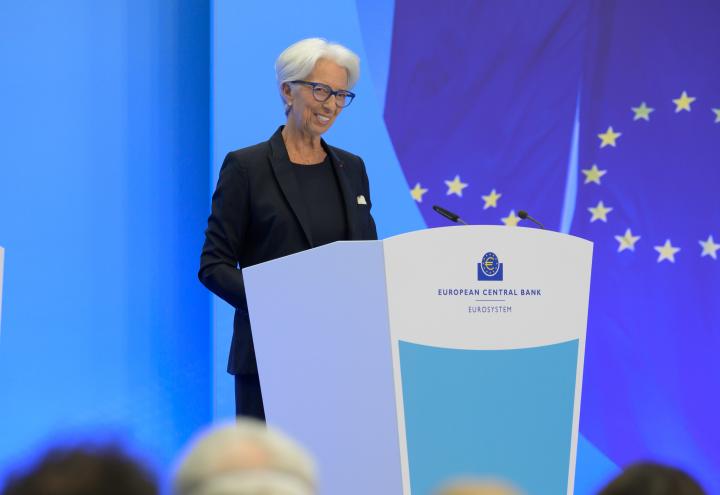
While closing the door on a seven-year era of negative interest rates with a larger than anticipated rate hike, the European Central Bank on Thursday committed itself to a more assertive defence of cohesion between the 19 economies that use the euro. President Christine Lagarde described the move as “a rather historical moment”.
The 26 members of the ECB’s governing council, which includes the eurozone’s 19 national central bank governors, unanimously agreed to introduce a new instrument that will protect the transmission of its monetary policy across the eurozone. With that decision, made on the same day that former ECB president Mario Draghi stepped down as Prime Minister of Italy, the ECB significantly ups its game to defend the euro.
“The whole team, the whole Governing Council. 25 members around the table, actually are in complete alignment in their support for a transmission protection instrument, which we regard as critical in order to properly transmit our monetary policy going forward,” Lagarde said. “So in that respect, at least from the president of the ECB point of view, yes, I think it’s quite a gratifying moment.”
Lagarde’s apparent relief on the outcome of today’s ECB meeting suggests a deal may have been struck between hawks and doves among central bankers on the governing council, said Simon Harvey, head of FX analysis at Monex Europe, with more flexibility in the TPI programme in exchange for a larger rate hike.
‘Unwarranted and disorderly’ market moves
The new instrument will be known as the Transmission Protection Instrument, known as TPI, and will be a third instrument in the ECB’s toolbox. It can be used to manage spreads between eurozone government bond yields and prevent them from moving further apart by allocating additional liquidity to troubled markets such as Italy and Greece.
“TPI will help us deliver on our mandate of price stability,” Lagarde said, adding that the tool enables the ECB to “counter unwarranted and disorderly” market movements such as rapidly widening yield spreads between government bonds from different countries. In the TPI programme, the ECB also will consult with the European Commission, the Council, the European Stability Mechanism and the International Monetary Fund.
At the press conference, Lagarde declined to directly answer questions in relation to the unfolding political crisis in Italy - which has led to a spike in spreads - and repeatedly underlined that the instrument will be equally available to all eurozone countries.
“TPI is a programme that is designed to address specific risks that all euro area countries can face, so all euro area countries are in principle eligible,” Lagarde said. It “is available to all countries of the euro area because of concerns that monetary policy is transmitted throughout the entire area.”
Adoption of the TPI programme also paved the way for a 50 basis point increase in the key ECB rates, a move that earlier had been flagged for September. Asked about the ECB’s forward guidance, Lagarde said today’s rate hike does not mean there will be another 50 basis point increase at its next meeting in September.
Path towards ‘broadly neutral’ policy setting
“We will be operating month by month meeting by meeting on the basis of data, and we will adjust and calibrate accordingly,” she said. “We are much more flexible in that we are not offering forward guidance of any kind. I was asked several, several times of questions about September. There is no such thing. We are data dependent. But the ultimate destination of our policy path remains the same, which is to progressively raise interest rates to broadly neutral setting. That’s where we want to arrive. “
“Today’s decision by the ECB is a step in the right direction,” said Monex’s Harvey. “They have acknowledged that explicit forward guidance on rates is a fools game in the current environment.”
A decision to activate TPI will be based on an “comprehensive assessment” of a country’s economic and fiscal fundamentals. The ECB will apply four criteria. Countries that want to benefit from TPI will need to comply with the EU fiscal framework, which means it should not be subject to an excessive deficit procedure. They need to demonstrate an absence of severe macroeconomic imbalances, fiscal sustainability and sound macroeconomic policies. This means they need to comply with specific fiscal recommendations set by the European Commission.
Asked about the size of the program, Lagarde said there would be “no ex ante limit”. “We would rather not use TPI but if we have to use it we will not hesitate. We will not,” she said.
TPI comes in addition to the ECB’s tools for flexible reinvestments of redemptions, enabling the bank to deal with what it sees as unwarranted fragmentation risks that stem from the Covid-19 pandemic, and the Outright Monetary Transmission, or OMT, instrument to address policy transmission imbalances caused by redenomination risks.
Related articles on Investment Officer Luxembourg:
- ECB seen doubling up with 50bp rate hike on Thursday
- Crisis in Italy brings back fears of eurozone crisis
- ‘Defending eurozone spreads clears path for rate hikes’